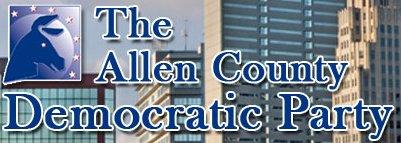
News release from the Allen County Democratic Party:
Attorneys and Voter Advocates Ready to Protect Voter Rights
Voter ID laws; Change of address rules; Student rights among potential voting issues
(November 1, 2012) – On Friday, Jack Morris, Executive Director of the Allen County Democratic Party announced the formation and training of attorneys and other voter rights advocates to be available throughout the Election Day next Tuesday. Although Indiana’s voter law has not had any significant changes since 2008 Morris pointed to several areas which may be confusing to first time voters and those who have had limited voting experience.
This group is simply attempting to compliment the on-going voter education efforts by the Allen County Election officials as well as civic advocates including the League of Women voters, the NAACP, the Indiana Building Trades and the Allen County Democratic Party.
Begging with the 2008 Presidential election Indiana and Allen County have seen a dramatic increase in registration of voters which has increased the workload on all phases of the voter education, registration and actual election process. This dramatic increase has also brought challenges to keep the new voters informed and engaged. One crucial aspect of transferring a new voter into a dedicated repeat voter is to make sure the system is open, fair, and not intimidating.
Throughout the United States there have been battles over voter rights and various restrictions imposed in different areas. All of this news increases the possibility of a voter feeling intimidated about the process of voting. Even the good-faith efforts by voter advocates to call attention to potential voter suppression efforts may increase the anxiety of a new or infrequent voter.
To help reduce any anxiety a voter may have we have organized these voter advocates to be present in the polls and/or available by phone to be called to the polling place to help as needed. The services are free and are available to any voter with no questions regarding party affiliation.
Voter issues include:
[list type=”black”]
[li]Indiana voter ID law which requires a valid photo ID issued by any division of the State of Indiana or the U.S. Government which also lists an expiration date indicating it has not expired or expired after Nov. 2 2010.[/li]
[li]Additional documentation which is required for a first time voter: This can be satisfied by a valid photo ID if it shows the current address; otherwise the voter must produce the photo ID and an additional document such as a current utility bill, bank statement or any mail from the government which documents the voter’s current address.[/li]
[li]Rights of voters when they have moved since the last election but has not re-registered at the new address. The voter can vote however, the impact of the move on voting rights is different depending on when the voter moved and whether the move was outside of the prior precinct or state but the rules are straight-forward and the bottom line, any valid registered voter should be allowed to vote.[/li]
[li]The location where the voter is required to vote can be misunderstood. Unfortunately, due to a variety of circumstances the place you are required to vote may not be the polling place you can see across the street from your home. The location can be looked up using the voters address or precinct number at the Allen County Election Board at www.allencounty.us/election-board[/li]
[/list]Morris emphasized that no voter should accept being turned away at the polls without first speaking to a voter advocate. If a problem cannot be fully resolved on Election Day any voter may cast a provisional ballot which will allow time to clarify any confusion and allow the person’s vote to be counted. To obtain the free help of a voters advocate the voter should ask if there is an advocate present at their voting place. If there is no advocate at the polling place the voter can simply call 478-8239 or 417-6177 and ask for a voter advocate. The first number will ring into the Democratic Headquarters but the voter will not be asked about any candidate or political party the voter supports. The advocate aid in attempting to allow the voter to vote in the traditional method but if that effort fails the voter will be guided through the process of casting a provisional ballot.















